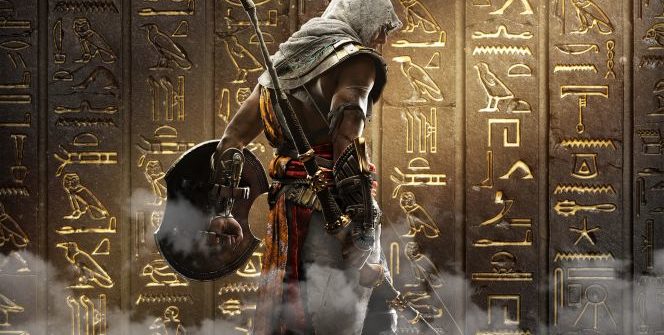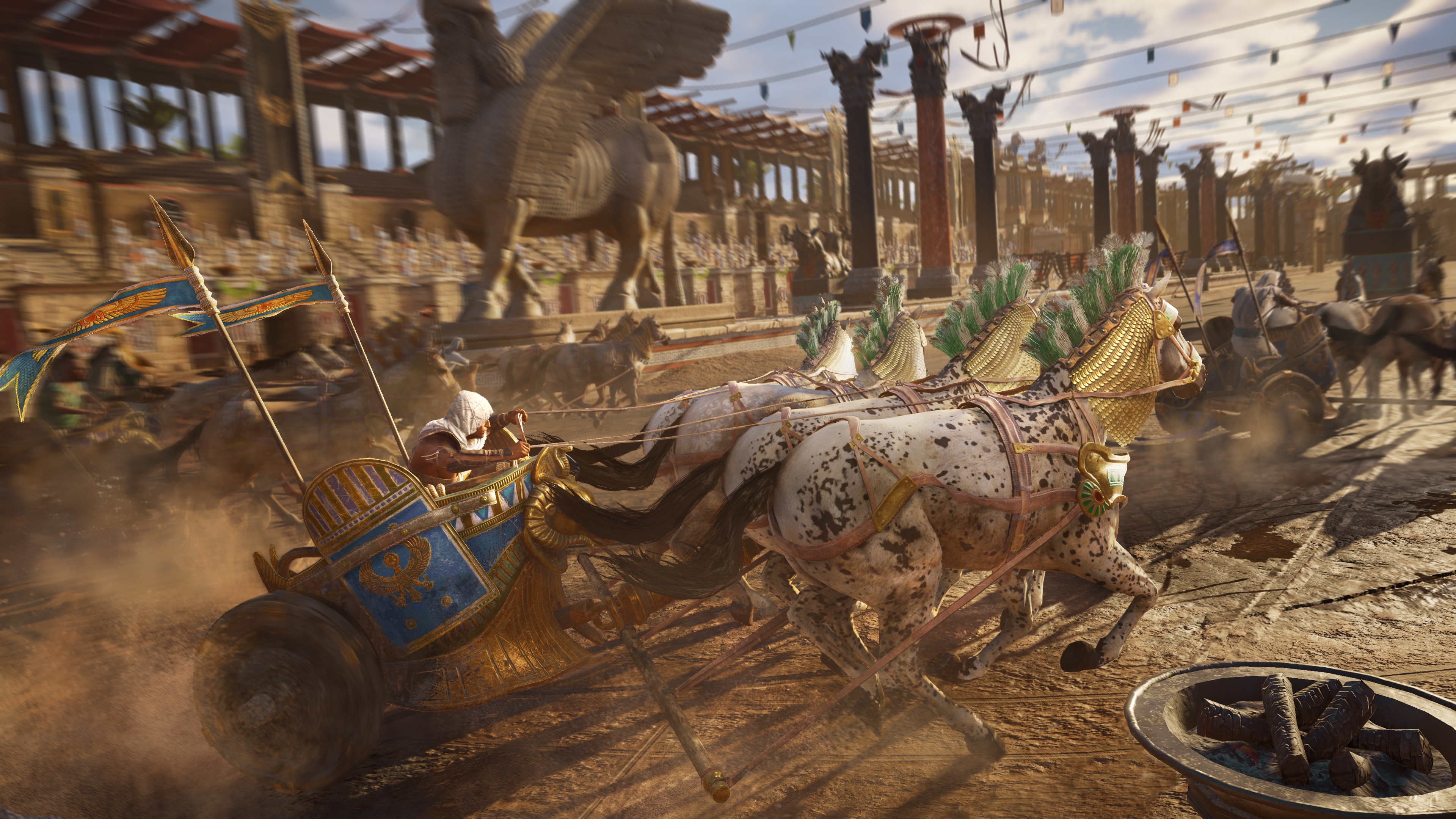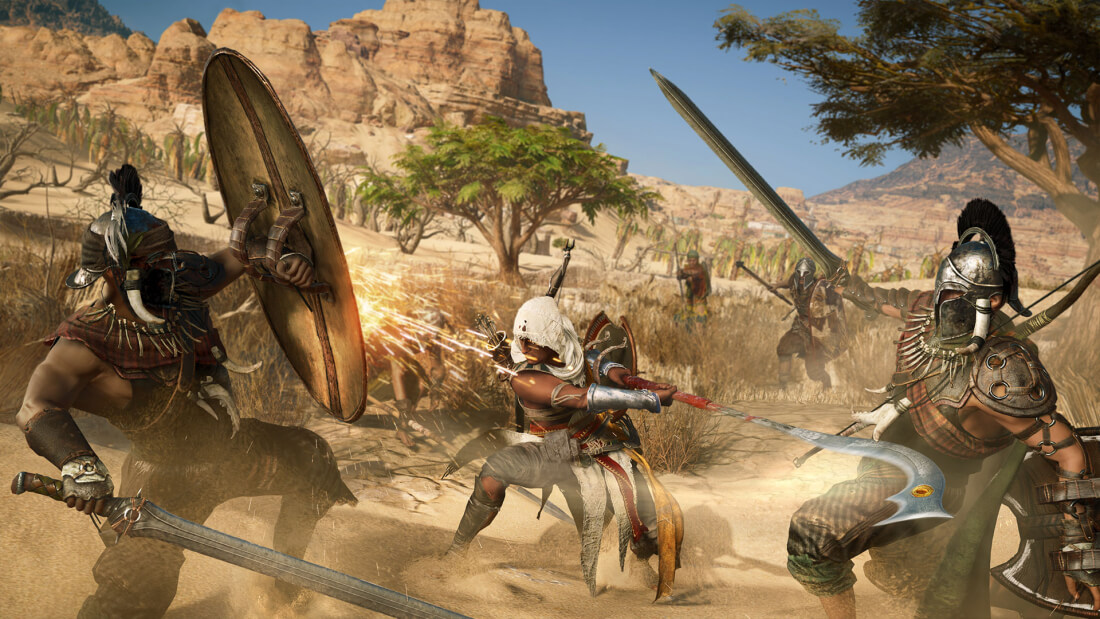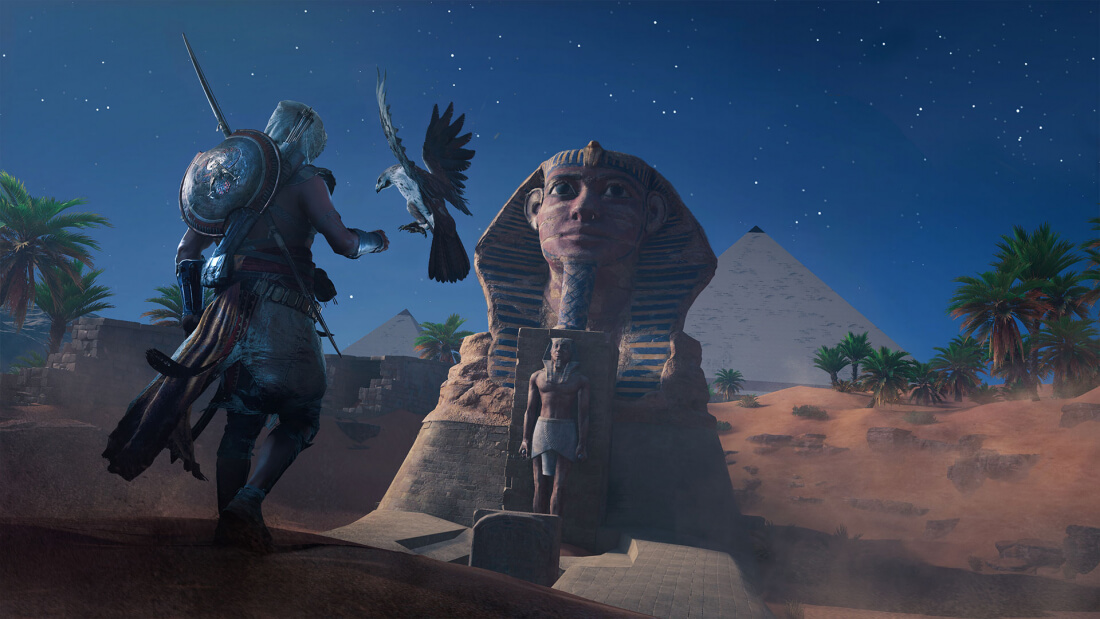REVIEW – Bayek of Siwa is the latest assassin in Ubisoft’s long-running series of historical open world extravaganza which pits assassins and templars against one each other. Alternatively… should we say, that is he is the first? Indeed, Origins is set long before the very first Assassin’s Creed game and – as the title suggests – it is the origin history of the whole assassin myth. Does it matter anyway? Moreover, more importantly: does the game stand up the renomé of the brand?
Giving Egypt to the fan might seem like an easy way out, but it was not. It supposes to go back in time in a franchise that has been characterized by its advance period after epoch and, as the very name of Assassin’s Creed Origins suggests, implies also studying the beginnings of its mythology. Entrusting the time of the pharaohs to the company signed by the extraordinary Assassin’s Creed: Black Flag is not a decision that has been taken lightly and is that this setting and that team with their particular way of understanding the series seem to be a ring finger. Moreover, finally, to paralyze a brand that is a real ticket factory for a year is a disturbing decision for the shareholders of a corporation as big as Ubisoft that, in the last few dates, has been hectic today due to Vivendi’s attempts to get hold of her. However, do you know what all this denotes? Trust in what is presented on this occasion.
Moreover, after having finished the great adventure of Bayek, I can confirm that there were reasons for it to have such support and security. Origins not only takes everything that has characterized the Assassin’s Creed saga and, for the most part, improves each of those elements, but drinks from everything Ubisoft has proposed in that genre of open worlds that they like so much cultivate. Here are recognizable things from Far Cry, Watch Dogs, The Division … however, also many aspects learned from other references such as Zelda: Breath of the Wild, the Souls series or The Witcher III: Wild Hunt. Original? We could argue for this constant “sin” of self-reference to other products developed internally. Sparkly? To affirm categorically that it is admitted a little reply rather. That of “Origins,” I insist, is not a nomenclature chosen by chance: We speak of a new and exciting beginning for the IP.
Bayek: The Origin of Everything
The most tricky when talking about Assassins Creed Origins is the plot, and it is because it is a section of the irregular performance. On the one hand, the main story is difficult to digest in a very literal sense. Touch all possible clubs and do not just round up something estimable in any of them. To start the campaign there is an eminently familiar part with a dramatic point and much potentials that seems to start strongly, but quickly dilutes. It is soon replaced by the passionate love story between the protagonist and his wife, Aya, a couple for whom Ubi has devoted many efforts to make it clear that they have a full sex life and, for being an atypical duo of protagonists, could have given good returns. They do not just transcend if I am totally honest.
What happens next? When it seems that this duo could offer an interesting result, again their presence is diluted and leaves its place to a plot of conspiracies. There comes into play there a Cleopatra that comes to us at 6-8 hours of play and tries to take control of Egypt to fight Ptolemy XIII, and also have other important pieces of the board such as Julius Caesar or Pompey. There is still another turn on the road to end up consolidating a terribly dislocated argument, and some pieces work well independently, but as a whole, it is very difficult to follow with interest.
Already the thread itself is quite conventional, but if we add that the nature of RPG elements of the title forces us to space the main missions very much so that we have the sufficient level to be able to undertake them, it makes the medium term attractiveness end up falling. It is the final third when Ubisoft takes the pulse of what we are told, which improves the title in this field. Nor do interludes help in the modern era, something that had been lost in recent times and that returns here although with a rather modest importance and presence. The team of Ubisoft that already signed at the time Assassin’s Creed IV: Black Flag has wanted to recover that aspect of the franchise that, not for discussion, ceased to have an important backbone for the first chapters. Some of the ideas that are proposed in the first instance from your point of view I like, such as the good integration offered by history the fact that it is working on the ground in the tombs of the protagonists of the historical part instead of in A cold, futuristic building. However, the thing is twisting little by little to take us by the hand to somewhat absurd sequences.
So far everything seems bad news, and in fact, the general feeling is that the main argument is not so worked and that the protagonist, Bayek, is blurred and is nothing charismatic. I can not contradict any of that. However, there is something quite positive about the plot, and it is a great enhancer to maintain interest when the main thread can not achieve it. I am talking about secondary missions, a great series of alternative and optional commissions that tell small mini stories outside the plot and that, in most cases, are really good. Yes it is true that there are some of the kind of “rescue a relative”, “I have stolen this or that thing” or “escort a certain character” that could not be more generic and are frequently repeated, but also There is room for others that are really well written, that deal with interesting topics and with some surprising moments that are followed with great interest.
The expression “ups and downs” is abused, and I include myself, but it is the best way to define what all these mini-arcs of the plot offers. There are some very good, and others worse. However, I understand, and not only that but I understand that it has a difficult solution. There were about a hundred missions that I completed to finish the game with the necessary level for Bayek and, even so. Afterwards, I continued to complete several dozens of other missions yet to be discovered or fulfilled. How much will Assassin’s Creed Origins missions total? It is difficult to quantify them because you have to look for life to find them, and I always have the feeling that I still have many to discover in any lost street in the cities, in any village that I overlooked or in some other desert oasis.
A total of 150 to complete the game? Maybe 200? Think about it; it is literally impossible that they are all at the same level. What is your favorite show? Breaking Bad? The Sopranos? Mad Men? All of them masterpieces that have better and worse episodes and even some of the latter that, in the end, have made me wonder if anything really happened in those 50 minutes that I spent in front of the television. What is clear is that Origins has spread the spirit of CD Projekt Red with its brilliant approach to The Witcher III: Wild Hunt, and is that this time without having a good base material as the CD Projekt Red had neither are such brilliant scriptwriters, it has been obtained a result that, in its best moments, does not detract at all.
There are moments of mysticism that have pleased me much despite resorting to springs and a thousand times seen, and in general the historical backdrop has given me the feeling of being well-taken advantage of in this area with some great moments in which history and fiction intertwine in a way that only Assassin’s Creed knows how to do. The fact that these main objectives revolve, almost always, around the investigation, preparation and execution of murder also allow the Ubisoft designers to create very attractive situations. Operations that take place in emblematic places such as the pantheon, a hot spring or in a sandstorm alternate with other moments that have been recorded in my retina as chariot races, fights against mythical beasts or even some naval battles that return us the most Black Flag spirit of a studio that shows that it has been liked.
Point
There are many things that have become traditional in the AC saga, and that generate mixed feelings. One of the most criticized has traditionally been combatting, one that initially created a school for its simplicity and comfort when it came to carrying out spectacular maneuvers, but which was also questioned by the usual resort of surrounding ourselves with enemies but that these were they will attack when they attack us. One of the key points in the roadmap of Ubisoft for this delivery was to improve in this area and go if they have succeeded. Are you one of the veterans of the series? Have you been playing games of the brand for so many years that you know your memory controls? Well, forget everything you have learned. Ashraf Ismail and his team have redistributed the pad aware that the greatest weight now lies in combat, and knowing that with the old combination of buttons could not create something as deep as what they wanted.
The tutorial that composes the first minutes of the experience seemed indicative and, although I was warned by the comrades of the magazine that the change was radical in the management, even so, it took me at least an hour or two to “get the hang of it” and start to feel comfortable. Many people are going to reveal themselves against this because there is always a rejection reaction in the first instance on the part of the most conservative user profile. Moreover, in fact, I have to admit that I worry that the brutal attention paid to the confrontations against large contingents of enemies raise the feeling in more than one that the part of going unnoticed has been neglected.
What we are going to do most in AC Origins is sure to fight, either in stealth mode or bare-chested, so the fighting actions claim their place in command. Ubisoft has built an agile system that allows you to roll or counterattack for defense with great agility, and be truly devastating in attack maneuvers that now comprise up to four buttons with various combinations, and mix with each other or even leave them tight. Apart from the fact that in closed spaces there is some discomfort derived from the camera and that the fix is useful only for the strongest and longest opponents, it seems to me that there is little to reproach.
It is a positive fighting system because it allows many alternatives, including close range and distance thanks to the excellent use of the bow, but also because at the same time it is addictive and offers a very interesting challenge with enemies that continue to surround us but attack at the same time, they create tactics, they look for advantages and also they are adapted to each situation, counting many of them with weapons and shields or with bows, and employing one or the other as the moment requires in a very dynamic way of putting us in trouble. There is something of the Souls saga in the distribution of the buttons, but also in the spirit and, in fact, surely the veterans of the From Software saga will employ more defensive tactics that are essential when faced with rivals of a higher level than ours.
Moreover, there lies one of the things that Origins do best, and that is to integrate very well its level-based scheme with a satisfactory experience. Clint Eastwood and Eli Wallach established in The Good, The Bad, and The Ugly that “the world is divided in two,” altering what made that fraction according to what interested them in one of Sergio Leone’s best recurring jokes. Well, the world of open-world RPGs is divided into those that use the so-called “auto-level”, which allows us to explore the world freely knowing that adversaries will adapt to our level; and those that do not, that end up dividing it into the areas to which it is advisable that we start and to which it is better not to approach. Like The Division, also from Ubisoft, the game resorts to informing us with level numbers on the heads of our adversaries, and with some very graphic skulls in case there is so much difference that the combat is unsolvable in our favor.
Why do I speak so positively about this? Because the experience will be as exciting or challenging as we wish. It is true that there are three ranges of difficulty, I recommend the medium by the way, but what really matters is the level. Let’s start with that you have a level 10, okay? If you go for missions of level 5 or 6, it will be a walk in the park nothing stimulating. If instead, you choose to do the recommended for your rank the thing will be simple, but still, have to take certain precautions. If we want it to be exciting, it is enough to start missions for which the recommended level is a higher pair of values. I have seen what adrenaline is then, and I have even surprised myself by jumping once or twice from the chair at the end of a mission with a very close combat. For someone who has been in this for more than a decade; it is not usual.
In the end, everything we do in Origins revolves around getting experience points. I do not exaggerate one iota if I tell you that everything contributes points. Do you discover a location? XP ration. Do you kill an enemy? Points for you Do you complete a mission or “clean” an adversary fortress? More experience. Do you climb a watchtower and recognize the terrain to see what secrets it hides? Guess … Exactly, points for you. With these, we improve our health and attack values every time we raise the level, but we also get a skill point with each “ascent.” It is different for the franchise, and it is a breakthrough for the brand, and it makes more sense to be a completist. Black Flag was an extraordinary video game, but completing its islands 100% by freeing them from enemies or finding their treasures was rather anecdotal. In the new Assassin’s Creed Origins, cleaning a fortress by killing its commanders and making us with its booty not only offers team rewards that come in handy but also gives us generous bonus points.
In fact, talking with other comrades in the press about the game, we wondered if this mechanical debit role would be a specific case for the saga or if it would be the future line to follow: A starting point like the one I have decided to use a nomenclature for baptizing this section. My feeling, obviously, is that this small revolution will mark the future of the series … Moreover, although as I said, the pre-eminence of combat will receive criticism for reducing the interest of opting for stealth, I think this Mutation is for good.
A strange universe
At a time like the one we live in that many fans seek, with all logic, squeeze every euro spent on a video game, Assassin’s Creed Origins comes loaded to the brim with things to do. It is not only that I have already commented on some obscene missions, is that apart from that there is a lot to do and the fact that the role concept of the game gives meaning and relevance play in their favor. It is easy that, after the prologue, we feel a certain sensation of being overwhelmed when the whole map opens before us. I am at the expense of starting to establish the classic comparisons between game sizes, but the new video game Ubisoft I found overwhelming dimensions. The positive thing is that it has always given me the feeling of being the well-taken advantage of.
Being well used, of course, does not mean that it is full of things, but that everything is well planned. There are parts of a density of activities to do wild, such as cities for example, where you kick a stone, and you get missions, random events, shops, watchtowers or garrisons to release. However, there are also parts of the desert that are correctly represented regarding their sense of emptiness and the colossal sensation of scale they transmit. It is not that there is nothing, you may end up with a temple to plunder, with some curious minigames related to the stars and with some other puzzle or even with some other herd of hyenas that make things difficult, but desert They live up to their name. The positive thing is that of the gigantic map that there are these surfaces scarcely supposes 15%, approximately and that they are sufficiently well distributed so as not to have to happen through them if indeed we do not wish it. To do so, of course, is an experience that I recommend. Not only because of its sense of immensity and the beauty it deserves, but also because if we spend enough time in it, we find suggestive mirages that help offer a slightly more mystical side to the protagonist.
If you want strong emotions, swamps or areas of dense vegetation are more attractive. Mainly because there is much more to do there. Enemy fortresses are full of adversaries, many more activities and above all a fantastic fauna to hunt or use. Hunting is clear, Ubisoft has exhibited it with force in the Far Cry series demonstrating that with skins and materials can develop a very interesting manufacturing system that here, although surely on a smaller scale, is again present. What does it mean to employ? Following the example also of that brand, it is usual that we can use caged lions, for example, to open them inside an enemy camp and sow chaos. However, we can also provoke such situations with those who are not in captivity if we are skilled enough in the open field, and it will also be usual for us to see civilians requiring our help when attacked by beasts. You will see many times a citizen pursued by hippos if he has approached a region where they abound, a sailor attacked by crocodiles or some other beast of land that approaches a village and sows chaos. As always, everything we do for them within these random events will have a positive impact on our experience.
Of the desire that we have to improve our team or increase of experience will end up depending our interest to take advantage of everything that the video game offers in the rest. I have already commented in the analysis that there is a repetitive pattern in secondary missions derived from the fact that, for many models that are introduced can not make more than a hundred always feel different, but the work offers a way to combat it. Yes, there are plenty of investigating The Witcher 3 style, other anodyne about the following someone and many about rescuing someone and transferring it to a certain place on the shoulders of some disabled and distressed person who miraculously recovers mobility when we leave him in the goal. However, there is also the possibility of going hunting to obtain materials and manufacture our improvements, assault forts to gain experience and get us a good booty, in addition to collecting gold and fame in the gladiatorial coliseum becoming a respected fighter or participate in the chariot races. When you see the skill tree and start looking at the spectacular things that can be unlocked and learned at such high levels, it will start to sting the worm and will be the best fuel to keep you stuck to the screen.
Egypt Cobra Life
The Assassin’s Creed saga has always been a benchmark in visual terms, and this has been demonstrated by the fact that year after year its deliveries have been titles that have been counted among the most shocking that reached the market ahead of the Christmas campaign. Origins were looking a step further, being as it is already the third episode for the consoles of the current generation and taking advantage of the extra power of machines such as PS4 Pro and, especially, an Xbox One X in which we had particular desire to see it in motion. Ubisoft, for now, has made it easier for us to play until we finish precisely that version and also to try out the PlayStation 4 and the conclusions have seemed tremendously positive.
Visual splendor
All the virtues that the series traditionally shows in the artistic scene once again shine with a backdrop as spectacular as that of Egypt. The title makes good use of the constructions and imagery of that town and also, why not say it, a mystique that had enormous importance for that civilization and that here has a few drops of fascinating prominence that give us some of the best and most overwhelming moments of the video game. It is one of the titles in which more party can be taken to the photo mode. It is also a particularly ambitious production, since not only does it devote itself to recreating that region with an interesting wealth of biomes, but it also allows the luxury of giving a few brushstrokes from other towns such as the Greek and a Roman Empire that has Particular importance in the final third of the campaign.
What does the Xbox One X version guarantee? That everything that traditionally shines in the execution of the series, in Origins is multiplied. We speak of a great drawn distance, of good quality in the textures and of a rate of images per second firm and without problems without importing the tests of stress to which we put to the game loading of enemies the screen. In fact, elements that exploit other brands of Ubisoft, such as fire, have an important presence here. Not only because technologically they are frankly well executed and have a credible propagation, but also because they have playable effects that allow us to create powerful strategies with which to isolate enemies.
It is true that artificial intelligence, which in general is quite effective considering how complicated it is to manage it in such an open world, ends up committing recklessness when the fire enters the scene … however, it seems to me a problem rather less. Great effects, a very good lighting and a fantastic water and with careful waves, refraction of light and even dissolution of blood on its surface round a set of impact in which the vegetation, by quantity and quality, I thought no doubt the queen of the whole.
Logically the PS4 Pro edition cannot offer such quality in elements such as drawn distance and suffers from something more popping (the late drawn elements) in addition to some very specific difficulty to maintain the stability of the image rate by second at times like when the screen is full of enemies.
However, its benefits are also very good. On the other hand talking about Xbox One X that delay in recreating the graphics I found quite isolated taking into account some elements on the screen, and as for polishing I also see rather little to reproach. No need to remember that the fact of being a profile so open profile, with so much to consider and assuming such a large mapping and no loading times that separates regions has much merit such a good finish, but in the several tens of hours that I have used to finish the degree I observed a minor and purely cosmetic incidence in the first kinematics.
There is room for loot boxes, but their presence is anecdotal. They are bought with in-game money, which can be obtained generously and without problems in the games, and offers us some special weapons and armor. Yes, there are also abundant microtransactions that the video game itself called “game accelerators,” and that allows you to get some things more quickly in exchange for real money. Again, nothing that can not be achieved by playing so, always according to my judgment, nothing disturbing.
As for the audio, there are some things to tell. The music operates at a very good level, with good scores and a generous number to accompany us in the high number of hours we will invest in the game. The effects of sound, on the other hand, also yield to the height of what is expected from an overproduction of these characteristics. Regarding dubbing, there are some nuances to be done. Most of the main voices are really good, with some of them easily recognizable and with the appropriate level of drama. Special mention for Bayek, which gives him more personality and charisma than the character himself demonstrates throughout the adventure.
Among the selection, however, stands out for the negative that of Cleopatra. In a tradition in our country of linking famous personalities, surely with promotional intentions, when doubling relevant figures of history, this time has been chosen to choose Clara Lago to interpret it, with a result in general lines that collides with the other dubbing actors. On the other hand, I have not liked the little variety of voices and phrases for the civilians that surround us when we walk through the cities, and that they are frequently repeated.
It delivers
Assassin’s Creed Origins is exactly what it promised. Waiting a year for the adventure of Bayek has been worth it, and we are talking about an extraordinary launch that returns us to the best form of the franchise. With a more focused history and a less fickle quality level for secondary missions, we would speak of a stratospheric video game, but even so, it will be deservedly and with little discussion one of the best action adventures of this year.
-BadSector-
Pro:
+ The RPG factor has fit very well in the Assassin’s Creed formula
+ The new way of understanding combats brings a lot of fun
+ Visual, technical and artistically it is a scandal
Against:
– There are many missions, many, which means that not all are at the same height
– The main story is somewhat muddy and confusing
– Somewhat boring main character
Publisher: Ubisoft
Developer: Ubisoft Montreal, Ubisoft Bucharest, Ubisoft Kiev, Ubisoft Shanghai
Genre: Action RPG
Release date: October 27, 2017
Assassin's Creed Origins
Gameplay - 8.4
Graphics - 8.8
Story - 7.2
Music/Audio - 8.2
Ambiance - 8.5
8.2
EXCELLENT
Assassin's Creed Origins is exactly what it promised. Waiting a year for the adventure of Bayek has been worth it, and we are talking about an extraordinary launch that returns us to the best form of the franchise. With a more focused history and a less fickle quality level for secondary missions, we would speak of a stratospheric video game, but even so, it will be deservedly and with little discussion one of the best action adventures of this year.


/cdn.vox-cdn.com/uploads/chorus_image/image/55219247/ACO_screen_TombTreasure_e3_170611_330pm_1497209518.0.jpg)
/cdn.vox-cdn.com/uploads/chorus_asset/file/9537169/ACO_screen_BayekShield_e3_170611_330pm_1497209507.jpg)

/cdn.vox-cdn.com/uploads/chorus_image/image/57319123/ACO_screen_BayekAya_Previews_1506632365.0.jpg)


/cdn.vox-cdn.com/uploads/chorus_asset/file/9537155/ACO_screen_PyramidSlide_e3_170611_330pm_1497209516.jpg)














Leave a Reply